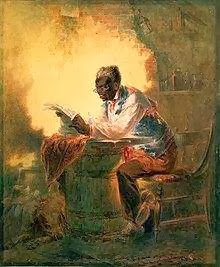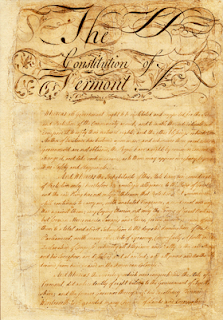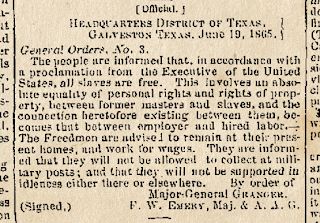Slavery has been a component of social and political organization since, at a least, recorded history. January 1, 2014 was the 151st anniversary of the Emancipation Proclamation issued by US President Abraham Lincoln. It has been a long struggle, in fits and starts, to end this abhorrent practice of one group of human beings controlling another. Today, slavery still exists for many people in our world. As we contemplate that very sad state of affairs and realize that the struggle never ends, we can hope that many more will celebrate freedom as African Americans did on January 1, 1863, listening to the sermon of Reverend Jonathan C. Gibbs titled “Freedom’s Joyful Day”.
 |
|
| Reading Proclamation 1863,by H.L.Stephens |
One of the most important steps to eradicating this institution, both as an acceptable practice and as an ideology, took place 86 years before President Lincoln’s proclamation, in 1777 in Vermont.
 |
| Vermont State Constitution |
Lawmakers enshrined the abolition of slavery in the constitution of Vermont State. From the 1790s to 1804, the other New England states followed suit to varying degrees: Massachusetts, New Hampshire, Rhode Island, Pennsylvania, New York, and New Jersey. While these actions did not result in the actual freeing of large numbers of enslaved people, they did set in motion the drumbeat of abolition and, ultimately, the Civil War and the Civil Rights Movements. The actions by these New England states have come to be collectively called the First Emancipation.
Subsequent to this First Emancipation, there were four more milestones. In 1862, the District of Columbia passed an Emancipation Act. Various Native American Nations had also engaged in practices of enslaving people defeated in battle. The Cherokee Emancipation Proclamation of 1863 provided safe haven for people fleeing slavery and abolished all slavery on Cherokee territory. The Loyal Creek Council decided, on August 4th, 1865, that African Creeks were considered full citizens of the Creek Nation. African Creeks established August 4th as Emancipation Day. In 1865, the Texas Emancipation Proclamation was declared by Major General Gordon Granger and came to be known as Juneteenth.
 |
| Texas Emancipation Proclamation |
The importance of all the Emancipation Declarations is the enshrinement into signed documents and the law that the treatment of humans as chattel is immoral, unconscionable, and impermissible. The long term consequences of this are invaluable. In the past, in various parts of the world, slaves and their descendants could be freed, released, incorporated into the population. There were laws in some eras and some places regulating these actions. But codifying freedom, declaring slavery an abomination, this was something entirely different.
